Editor's note: After the administrative unit arrangement, the 2-level local government model across the country has entered a period of strong acceleration. From big cities to remote communes, each grassroots government is learning how to serve better with a more compact apparatus. Wherever officials dare to change their way of working, people clearly feel the change. The series of articles "2-level local government - Accelerating right from the start" records the transformation journey of local governments - not through carefully crafted reports at conferences, but through slices of life in each ward, commune, reception door, and neighborhood meeting. The model of movement starts at each base, where administrative reform is no longer a slogan.
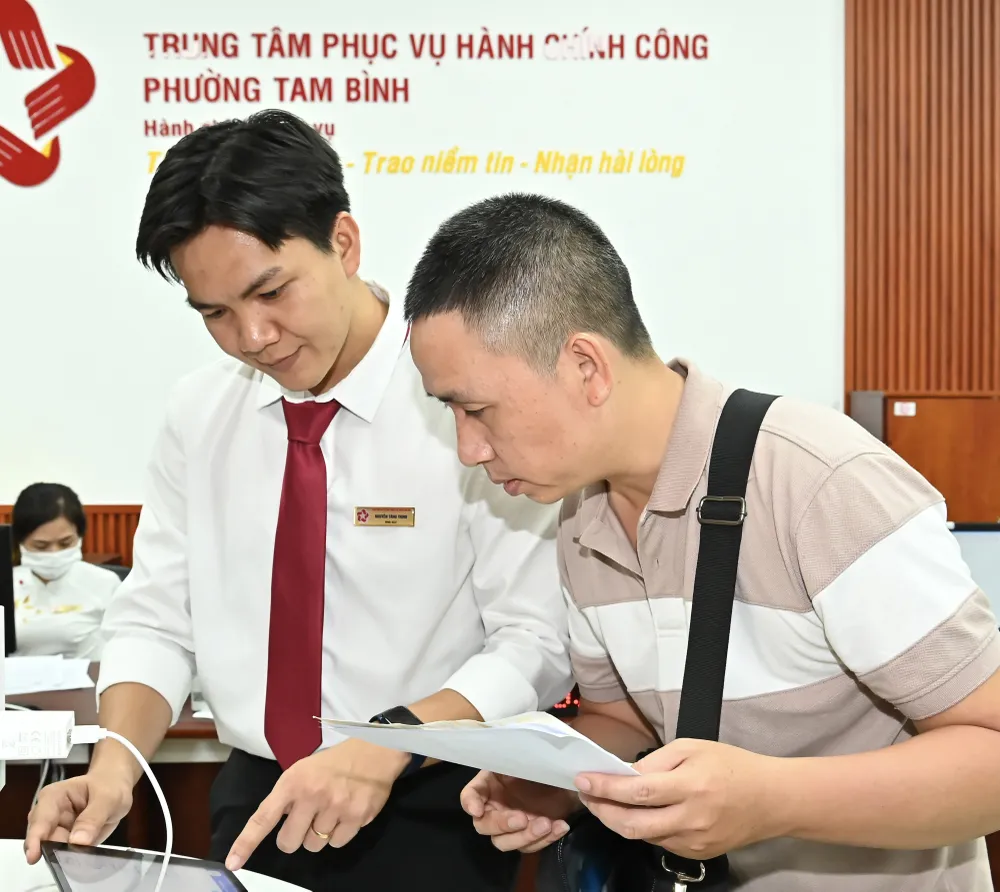
Outstanding amenities
In need of a Marriage Status Certificate, Mr. Nguyen Trong Nhan went to Tan Hung Ward (HCMC) to submit his application. At the Public Administration Service Center of the ward, he was guided by a volunteer youth force to receive the application form at the declaration creation kiosk. He inserted his chip-attached ID card into the scanning gate, selected the administrative procedure (TTHC) that he needed to resolve and pressed the button, a procedure declaration form with his full personal information was printed out. Mr. Nhan received it, signed it and waited for his turn in order to submit the application. Except for the waiting time, the application receiving process only took about 2 minutes. Impressed with the declaration creation kiosk, Mr. Nhan commented that the ward equipped this kiosk very usefully, helping people not to have to print the procedure form and waste time filling in information like before, but just a few operations on the touch screen to select the type of procedure and it was done.
Mr. Nguyen Minh Thien, Director of Tan Hung Ward Public Administration Service Center, informed that the ward has researched many solutions to support officials and civil servants in guiding and receiving people's documents, ensuring that people do not have to wait more than 20 minutes when submitting administrative procedures, including a smart kiosk that creates declarations by scanning chip-embedded ID cards. This solution helps people not to be confused in filling in information, and officials and civil servants also save time in guiding and editing information.
Ms. Tran Pham Thao Trang was very impressed with the Thu Duc Ward Public Administration Service Center (HCMC). As soon as she entered, a robot came to greet her and invited her inside. When she settled down in the waiting chair, another robot came out to invite Ms. Trang to choose a service with a screen with a QR code to get a queue number. Next, the first robot came to invite her to have water, snacks (like candy, cakes...) and reminded customers to put their trash in the bin. "Everything was very smooth and sequential. Two robots ran back and forth to serve each person, it looked very interesting," Ms. Trang shared. The Thu Duc Ward Public Administration Service Center is designed with an "open" space, creating closeness between officials, civil servants and people. There is a waiting area, a table and chair area for people to fill in information on the declaration form to perform administrative procedures. There is also a free legal consultation room deployed by the Ward Youth Union in coordination with the Ho Chi Minh City Bar Association Youth Union.
After operating the two-level local government, the People's Committee of Ho Chi Minh City announced a list of administrative procedures to receive and return results at the one-stop shop at the provincial and commune levels, including 2,168 administrative procedures in 15 fields. Of which, there are 1,862 administrative procedures at the provincial level, 363 at the commune level, and 9 administrative procedures under other agencies (some of which are under the authority of the provincial and commune levels). The People's Committee of Ho Chi Minh City also issued a list of administrative procedures that do not depend on administrative boundaries in Ho Chi Minh City (phase 1), including 1,182 administrative procedures under the authority of 13 departments and 154 administrative procedures under the authority of the commune level.
Chairman of the Ho Chi Minh City People's Committee Nguyen Van Duoc directed communes, wards, and special zones to proactively arrange the number of counters and locations of reception and result return counters at the Commune-level Public Administration Service Centers in a way that creates convenience for people and businesses when they come to transact administrative procedures. Proactively adjust according to the actual situation, not allowing overload or people and businesses to wait more than 20 minutes to submit administrative procedure documents. In addition, strictly implement the digitization of records, documents, and results of administrative procedure settlement in the process of receiving, processing, and returning results at the One-Stop Department. Reuse information and data that have been digitized, stored in national databases, specialized databases, and electronic connections to serve people and businesses.
Do not passively wait for assignment
The operation of the two-level local government apparatus in 34 provinces and cities nationwide has strategic significance, marking a new stage of development, towards perfecting a modern, creative, close-to-the-people, and people-serving administrative system. In operating this model, the commune level is the most direct and closest to the people. General Secretary To Lam reminded: "The settlement of administrative procedures for the people must be at the commune level, the people do not have to go to the province, city or the Central Government to do anything. For anything beyond the authority of the commune, the commune reports to the province or city, the people do not have to go to the province". The General Secretary also requested innovation in thinking and management towards a creative government; building a team of commune officials with comprehensive capacity, able to apply digital technology , understand the people, and closely follow reality; must promote administrative reform and digital transformation in handling procedures to interact with the people.
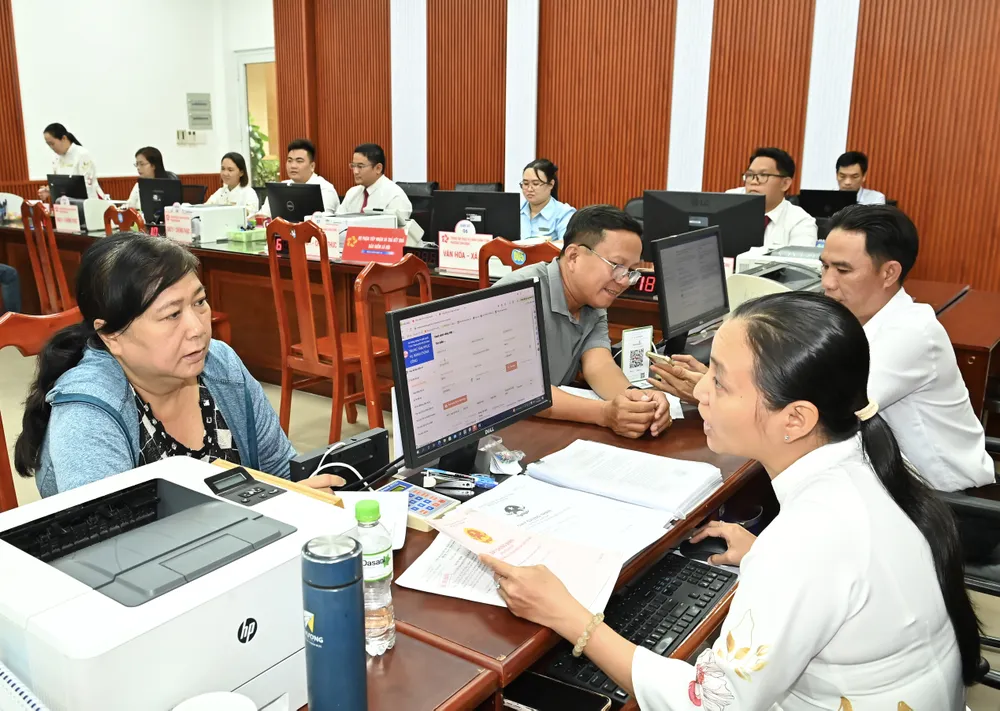
That spirit of direction has spread, creating a strong motivation among the staff and civil servants to work with a spirit of dedication, anything that is beneficial to the people must be ready to do immediately, even if it is an unprecedented decision. In Ba Diem commune, one of the most populous communes in Ho Chi Minh City, on average, about 350 files are received and processed every day; as of July 16, no files have been late, including many procedures previously transferred from the district level to the commune. Some procedures such as the issuance of the first Land Use Right Certificate, the issuance of Construction Permits... have been thoroughly decentralized to the commune, helping people to be more convenient and save time. In the first half month of operation, the commune has issued over 30 Construction Permits to people. People in need will be supported and resolved by the departments, offices, cadres and civil servants of the commune. In case the resolution cannot be immediate, the exact time will be announced for people to know. Thanks to that, the satisfaction rate of people and businesses with the commune's services always reaches 100%.
Mr. Nguyen Tuan Anh, Chairman of the People's Committee of Ba Diem Commune, said that in addition to supporting and guiding people to submit correct and complete documents, the commune has proactively cut down the process in the procedure of notarization. Instead of civil servants receiving, checking documents and then transferring them to the appraisal department, then submitting them to the leader for signature, the commune now assigns the responsibility to the civil servants receiving the documents to appraise them and take responsibility. This helps to reduce a step and shorten the time to process documents.
In Thanh An island commune (HCMC), surrounded by waves, the 2-level local government model still operates smoothly. Few people know that behind that peace are significant challenges, stemming from the unique characteristics of "maintaining the commune" - the commune-level administrative unit does not carry out the arrangement. With special communes like Thanh An, the People's Committee of the commune is not allowed to establish specialized departments or advisory units like normal commune-level administrative units. This means that all the advisory work, meeting content preparation, implementation of instructions, etc. are all concentrated on a very thin apparatus. While waiting for instructions from the Central Government and HCMC on the organization of the apparatus for special communes, the leaders of Thanh An commune are trying to manage and ensure smooth work.
Mr. Ho Hong Thanh Tinh, Chairman of Thanh An Commune People's Committee, shared that consulting, preparing documents, and holding meetings encountered many difficulties due to the lack of specialized departments. In order to avoid interruptions in work, the commune proactively established specialized groups that are close to Decree 150 of the Government, such as the Office of the People's Council - People's Committee, the Economic Group and the Cultural - Social Group, instead of official departments. In the context that the commune does not have a Public Administration Service Center, the commune leaders decided to establish a Public Administration Group to ensure service to the people.
Mr. LE THANH NGUYEN, Con Dao special zone, Ho Chi Minh City:
My fiancée and I went to the Con Dao Special Zone Public Administration Service Center to register our marriage. Because I had lost some old documents, before going, I was worried about whether the procedure would be complicated or not. Luckily, I was thoroughly supported by the staff. I only needed to provide information and my ID card and all procedures were processed quickly and smoothly. There were many people doing the procedures, the staff had a lot of work and were busy, but they were trying very hard, I could see that clearly!
Mr. BUI HUU THE, Deputy Director of the Public Administration Service Center of Con Dao Special Zone:
Con Dao Special Zone promotes the application of information technology, deploys the construction of Zalo OA channel to guide and provide information to people; people can also reflect and make recommendations through the special zone's electronic information page. The special zone is reviewing and planning to equip more computers, scanners, photocopiers, printers and other supporting equipment to better serve the online transaction needs of people and organizations... We are radically changing the way we work: applying modern technology, arranging staff according to task groups, arranging regular citizen reception schedules...
Source: https://www.sggp.org.vn/chinh-quyen-dia-phuong-2-cap-tang-toc-ngay-khi-khoi-dong-bai-1-ket-noi-do-thi-phuc-vu-nguoi-dan-post805735.html




![[Photo] Parade to celebrate the 50th anniversary of Laos' National Day](/_next/image?url=https%3A%2F%2Fvphoto.vietnam.vn%2Fthumb%2F1200x675%2Fvietnam%2Fresource%2FIMAGE%2F2025%2F12%2F02%2F1764691918289_ndo_br_0-jpg.webp&w=3840&q=75)

![[Photo] Worshiping the Tuyet Son statue - a nearly 400-year-old treasure at Keo Pagoda](/_next/image?url=https%3A%2F%2Fvphoto.vietnam.vn%2Fthumb%2F1200x675%2Fvietnam%2Fresource%2FIMAGE%2F2025%2F12%2F02%2F1764679323086_ndo_br_tempimageomw0hi-4884-jpg.webp&w=3840&q=75)

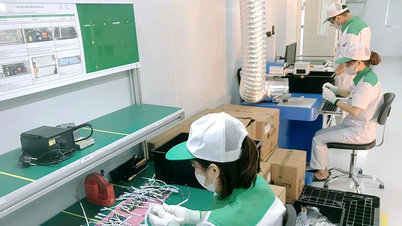



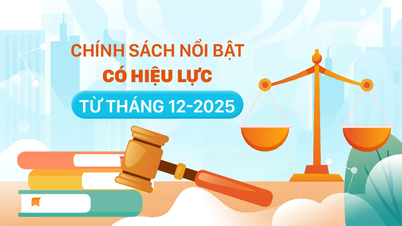


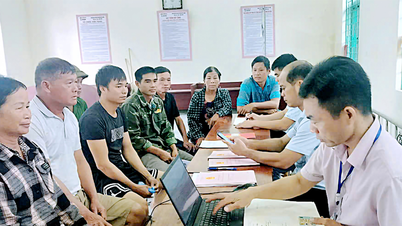

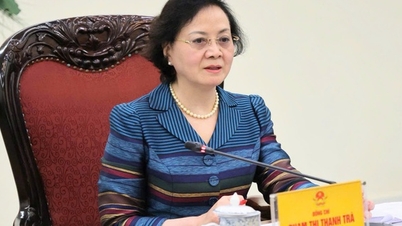

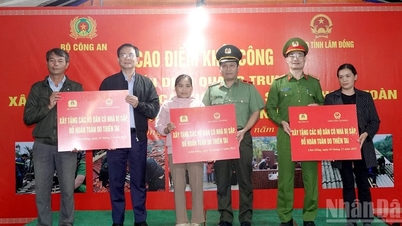

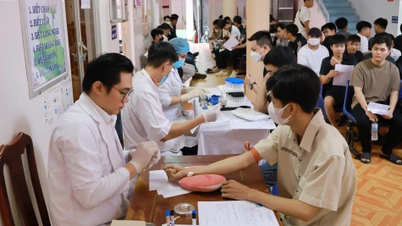


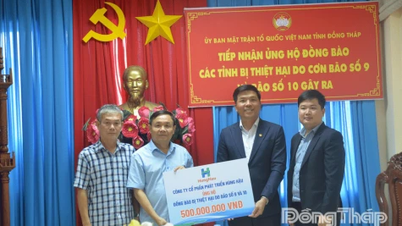
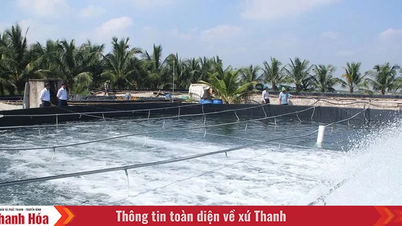

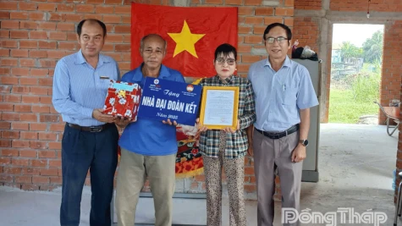







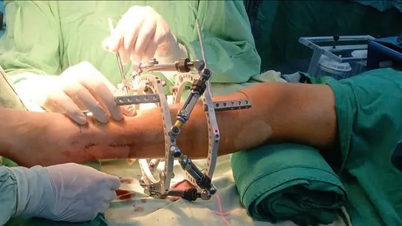


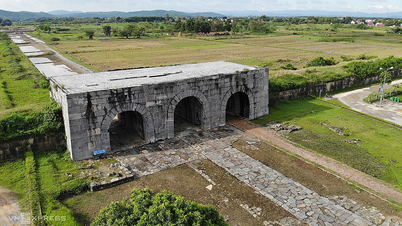

































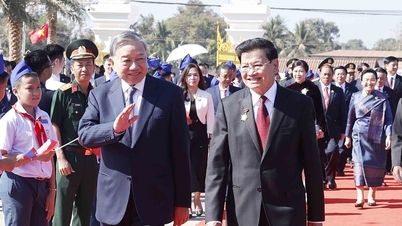
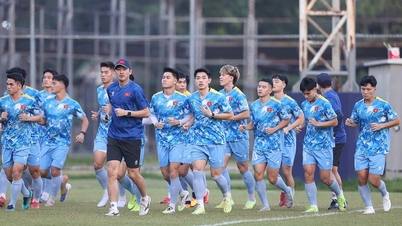



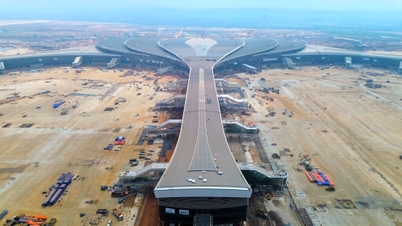

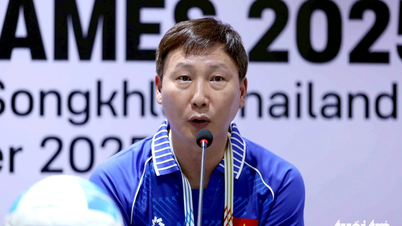

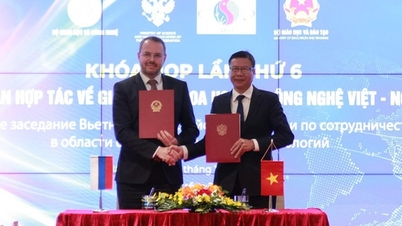
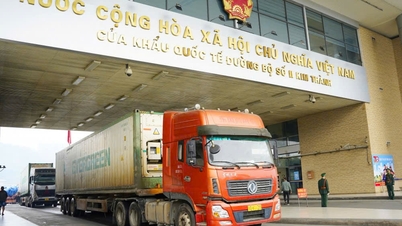



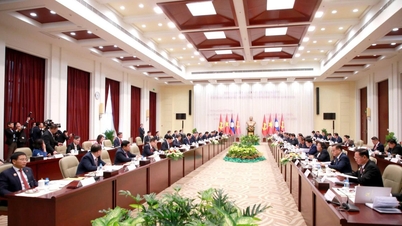

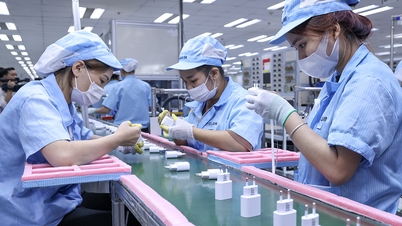
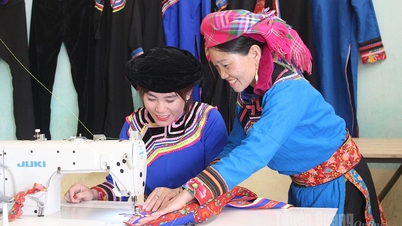


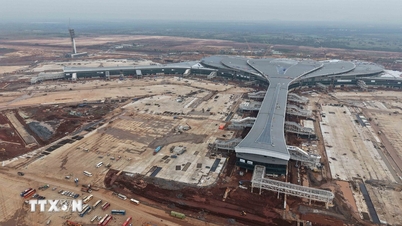

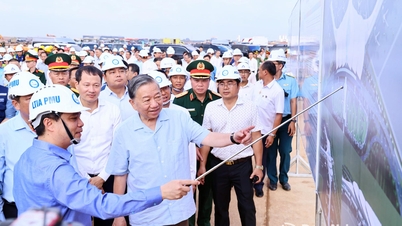


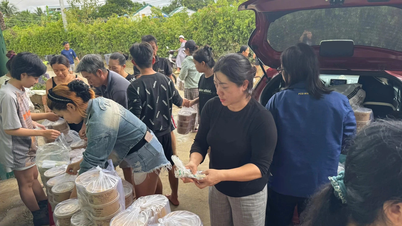













Comment (0)